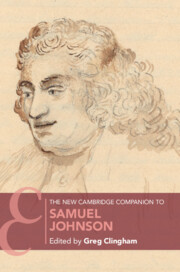Book contents
- The New Cambridge Companion to Samuel Johnson
- The New Cambridge Companion to Samuel Johnson
- Copyright page
- Contents
- Figures
- Contributors
- Short Titles and Note on the Text and Cover Art
- Introduction: Contemporary Johnson
- Chapter 1 Johnson, Ethics, and Living
- Chapter 2 Johnson and the Essay
- Chapter 3 Johnson and Renaissance Humanism
- Chapter 4 Johnson and Language
- Chapter 5 Johnson and British Historiography
- Chapter 6 Johnson and Fiction
- Chapter 7 Johnson and Gender
- Chapter 8 Johnson, Race, and Slavery
- Chapter 9 Johnson’s Politics
- Chapter 10 Johnson’s Poetry
- Chapter 11 Johnson’s Editions of Shakespeare
- Chapter 12 Johnson’s Lives of the Poets: A Guided Tour
- Chapter 13 Johnson as Biographer
- Chapter 14 Johnson and Travel
- Chapter 15 Johnson and Disability
- Chapter 16 Representing Johnson in Life and After
- Chapter 17 Johnson among the Scholars
- Further Reading
- Index
- Cambridge Companions To …
Chapter 10 - Johnson’s Poetry
Published online by Cambridge University Press: 22 September 2022
- The New Cambridge Companion to Samuel Johnson
- The New Cambridge Companion to Samuel Johnson
- Copyright page
- Contents
- Figures
- Contributors
- Short Titles and Note on the Text and Cover Art
- Introduction: Contemporary Johnson
- Chapter 1 Johnson, Ethics, and Living
- Chapter 2 Johnson and the Essay
- Chapter 3 Johnson and Renaissance Humanism
- Chapter 4 Johnson and Language
- Chapter 5 Johnson and British Historiography
- Chapter 6 Johnson and Fiction
- Chapter 7 Johnson and Gender
- Chapter 8 Johnson, Race, and Slavery
- Chapter 9 Johnson’s Politics
- Chapter 10 Johnson’s Poetry
- Chapter 11 Johnson’s Editions of Shakespeare
- Chapter 12 Johnson’s Lives of the Poets: A Guided Tour
- Chapter 13 Johnson as Biographer
- Chapter 14 Johnson and Travel
- Chapter 15 Johnson and Disability
- Chapter 16 Representing Johnson in Life and After
- Chapter 17 Johnson among the Scholars
- Further Reading
- Index
- Cambridge Companions To …
Summary
By considering several of Johnson’s critical essays on poetry, this chapter compares his criticism of poetry with his own practice. In his lives of Milton and Gray, Johnson emphatically rejects poetics that employ language, images, and situations distinct from ordinary experience and normal speech. Milton and Gray are found wanting in this regard, with “Lycidas” ridiculed for its pastoral fiction and Gray indicted for thinking that poetry should be written in language remote from common speech. In treating London and The Vanity of Human Wishes, Johnson’s two imitations of Juvenal’s Roman satires, Richetti explores their differences from the Roman originals and shows how Johnson’s poems share many qualities with his occasional verse, written for friends to mark personal events, sometimes satirically, more often affectionately. The Vanity offers readers Johnson’s verse at its most powerful, unsparing in its renditions of the human condition, giving common language a vivid and almost terrifying concrete particularity.
Keywords
- Type
- Chapter
- Information
- The New Cambridge Companion to Samuel Johnson , pp. 135 - 149Publisher: Cambridge University PressPrint publication year: 2022

